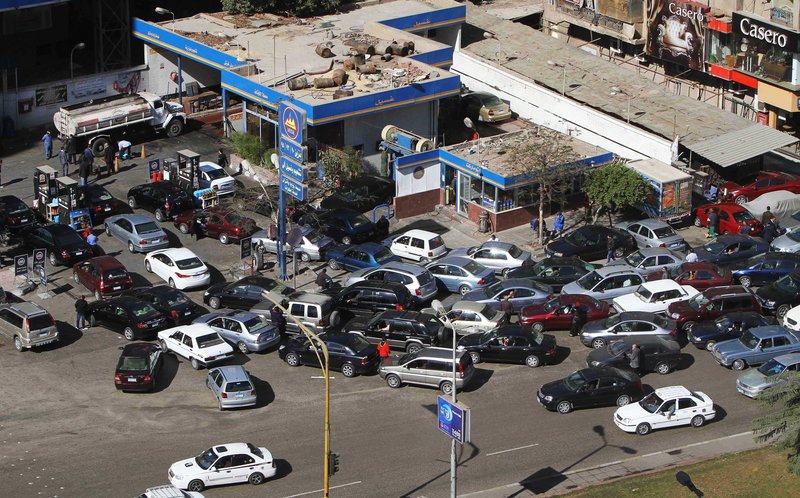CAIRO – Rumors about an impending increase in fuel prices sent Egyptians lining up at gas stations, spotlighting the latest crisis in Egypt’s political transition at a time when the economy is reeling and anger is widespread over the pace of reform after former President Hosni Mubarak’s ouster.
The latest challenge confronting Egypt’s military rulers and the interim government came after approval of a plan to cut energy subsidies for some industries was widely interpreted by the public as a move to cut subsidies for fuel on which millions of Egyptians depend.
Lines formed at gas stations, with some reportedly selling out of key grades of gasoline while others saying they had not received shipments of the fuel. As motorists stocked up, supplies were depleted and some stations turned customers away, further stoking the belief that not enough was being produced by the country.
Wael Ziada, head of Egypt research at Mideast investment bank EFG-Hermes, said whatever the root cause of the crisis, it could “become a self-fulfilling prophecy” in which prices rise solely in response to the rumors, irrespective of whether there is any truth to them.
At a time when the government is trying to rein in spending and foreign reserves are bleeding away, Egypt spends about 40 percent of its budget on fuel and food subsidies.
The support ensures that gasoline and many basic staples in the grocery stores are cheap, in a country where about 40 percent of the population of 85 million is near or below the poverty line.
Egyptian officials have been quick to deny that there is a problem with fuel production, blaming the shortage instead on unscrupulous traders out to make a quick profit.
The fuel crisis is a new headache for officials already under pressure from a populace angry over the pace of reform and worried whether the military will make good on pledges to hand over power to civilian authorities after presidential elections scheduled for June.
Petroleum Minister Abdullah Ghorab was quoted in Monday’s edition of the daily Al-Masry Al-Youm as saying that that traders were essentially hoarding fuel to drive up prices.
Deputy Oil Minister Mahmoud Nazim denied that fuel prices would be increasing, the official MENA news agency reported. Nazim said the country was currently producing enough to meet daily domestic demand.
Official denials, however, have carried little resonance in post-Mubarak Egypt. The fuel crisis offers a window into the country’s broader economic problems that have mushroomed since the authoritarian president was pushed from power in mid-February.
Mass protests have built up momentum over the past year, disrupting daily life, helping to inject tremendous uncertainty into the country’s political transition and, in the end, undercutting efforts to attract tourists and foreign investors. Those two sectors are among Egypt’s foreign currency mainstays. Net international reserves have fallen by 50 percent since December 2010, reaching $18 billion last month.
Send questions/comments to the editors.



Success. Please wait for the page to reload. If the page does not reload within 5 seconds, please refresh the page.
Enter your email and password to access comments.
Hi, to comment on stories you must . This profile is in addition to your subscription and website login.
Already have a commenting profile? .
Invalid username/password.
Please check your email to confirm and complete your registration.
Only subscribers are eligible to post comments. Please subscribe or login first for digital access. Here’s why.
Use the form below to reset your password. When you've submitted your account email, we will send an email with a reset code.